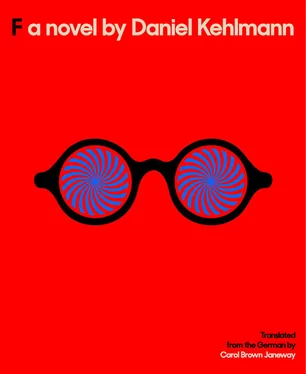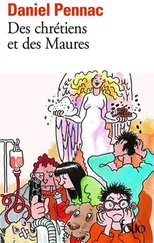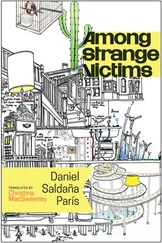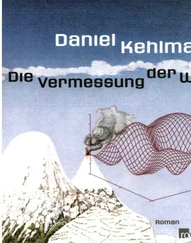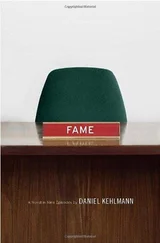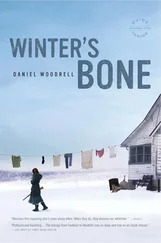Difficult, I say. There’s a lot of interest.
She can well imagine, says Eliza, but if you’re going to give a painting a home, it comes down to what neighborhood it will find itself in, and what company it will be keeping. She already has a number of Eulenboecks. Back home in Ghent she has works by Richter, Demand, and Dean, she has a few things by Kentridge and Wallinger, she has a Borremans, whose style is somewhat similar to Eulenboeck’s, and she has a John Currin. In addition to which she was lucky enough to know the master personally — not as well as I did, of course, but well enough all the same to know that he was no friend of the museum world. His work, she feels, belongs at the heart of the here-and-now, not in the storage rooms of galleries.
I nod vaguely.
Oh this heat, she says.
She fans air toward her, and although the restaurant has soundless ventilators, the gesture doesn’t look silly, coming from her. She has an effortless elegance. If women were my thing, I’d be in love with her.
Weather like this, she says, gives you a whole new respect for Moorish culture. How is it possible to build an Alhambra while exposed to such deadly heat?
In previous eras, I tell her, our species was more robust. Man’s constitution is not fixed, it develops over time. The road marches of the Roman legions achieved distances our world could only attribute to Olympic athletes.
A thought, she observes, that would have pleased Nietzsche.
But one, I reply, that only a healthy person should even formulate. The moment a tooth hurts, you are infinitely grateful for modernity and its alienations.
We stand up and embrace quickly with air kisses on both cheeks. She leaves, I stay and pay the bill. We’ll meet again, first at a dinner party, then perhaps a breakfast, then she’ll visit me in Heinrich’s studio, and then maybe the moment will come to actually talk about money.
I don’t have far to go to get home, I live next to the restaurant. In the hallway of my apartment, as always, I pause in front of the little Tiepolo drawing, happy to be able to call such a piece of perfection mine. Then I listen to the messages on my answering machine.
There’s only one. Weselbach, the auction house, informing me that a dealer from Paris has put up an Eulenboeck for auction the week after next. Old Death in Flanders , luckily a more or less minor work. No inquiries from potential buyers yet, but the dealer doesn’t want to withdraw the painting.
Not good! No inquiries up-front means that the interest driving the auction will be limited, and I’ll probably have to buy the picture myself to support Eulenboeck’s value. The opening bid is set at four hundred and twenty thousand — a lot of money, and all I’ll get for it is a painting I myself sold six years ago for two hundred and fifty. I’ve already had to buy three Eulenboecks this year, and it’s only August. I have to do something.
I call Wexler, the new chief curator of the Clayland Museum in Montreal. Actually all I want to do is leave a message, but in spite of the time difference he answers right away. He says he’s switched his office line over onto his cell phone and no, he’s not asleep, he’s broken the habit.
We chat for a while — the weather, intercontinental travel, restaurants we like in Manhattan, Lima, and Moscow. I wait for him to mention the Eulenboeck show he’s mounting the year after next and which will be very important for me, but of course he wants me to ask about it first, so we spend fifteen minutes talking about skiing, Haneke’s new movie, and places to eat in Paris, Berlin, and Buenos Aires. Finally he realizes that the cue isn’t going to come from me, and brings the conversation around to it himself.
“Let’s talk about it another time,” I reply.
He’ll be coming to Europe in a couple of months, he says, disappointed. Perhaps we could meet. For breakfast or maybe lunch.
Wonderful, I say.
How nice, he says.
Terrific, I say.
Good, he says.
I hang up. And suddenly, for no reason, I feel I have to call Eric. I hunt through my address book, I can never remember numbers, not even my brother’s.
“You?” His voice sounds even more tense than usual. “What?”
“I thought I should give you a call.”
“Why?”
“Just a feeling. Everything okay?”
He hesitates for a moment. “Of course.” It doesn’t sound as if everything’s okay, in fact it sounds as if he wants me to know he’s lying.
“So why do I have this feeling?”
“Maybe because today I hoped you and I … Ah!”
I hear horns and car engines and then there’s a sort of hiss: he’s laughing.
“I told my secretary to call you, but she … just think: she called Martin!”
“Martin!”
“We went to lunch. The whole time I was wondering why.”
I ask about business, and as always his answers are vague. Something’s not right, there’s some question he’d like to ask me, but he can’t get it out. Instead he focuses on my work, and although it doesn’t interest him, I say that you have to keep an eye on the auction houses and control prices. Immediately he interrupts me to ask about our mother, that tiresome subject, but I keep on digging.
“Something’s up with you. I can tell. You can deny it, but—”
“Have to go now!”
“Eric, you can tell me every—”
“Everything’s fine, honestly, got to go now.”
He’s already hung up. Talking with Eric is always strange, almost like talking to yourself, and suddenly I realize why I’ve been avoiding him for some time. It’s hard to keep secrets from him, he sees through me, just as I see through him, and I can’t be sure he’ll keep them to himself. The old rule: a secret only stays a secret if absolutely nobody knows about it. If you stick to that, they’re not so hard to keep as people think. You can know someone almost as well as you know yourself, and yet you still can’t read their thoughts.
Talking to Eric has reminded me that I have to call our mother. She’s left me three messages, so there’s no help for it. Hesitating, I dial her number.
“So finally!” she cries.
“I was busy. Sorry.”
“You were busy?”
“Yes, a lot of work.”
“With your pictures.”
“Yes, with the pictures.”
“Eating out.”
“That’s part of it. Meetings.”
“Meetings?”
“What’s the subtext?”
“I’m glad you have such an interesting job. It obviously feeds you. Whichever way you look at it.”
“What did you want, anyway?”
“The land in front of my house. You know, the big piece that reaches from my fence to the end of the slope, with all the birch trees. It’s for sale.”
“So.”
“Think about it, someone could build there. Because why else would anyone buy it! Whoever buys it is going to want to build on it.”
“Probably.”
“And my view? I mean, our view. You two will inherit the house, so the view matters to you too. Even if you decide to sell. And you will sell, because I take it neither of you is going to want to live here.”
“But that’s a long way off.”
“Oh, stop.”
“Stop what?”
“I wanted to propose that you buy the land before anyone else goes for it and starts building. That way you’ll protect the value of our house. And it’s a good investment.”
“How is it a good investment if I’m not supposed to build anything on it?”
“Don’t act as if you understand something about business, you’re … well, you’re whatever you are.”
“I’m someone who knows that a piece of land you can’t build on isn’t a good investment.”
“You could grow crops on it.”
“What would I do with crops?”
Читать дальше
